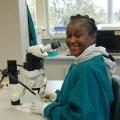What attracted you to your current role I have experienced firsthand the devastation of crops by insect pests that leads to economic losses and food insecurity. I am attracted to research that develops an understanding of interactions between insects, their host plants and the environment. Such understanding underpins the development of optimal pest management approaches. Grape phylloxera is a serious biosecurity threat and research on quarantine approaches was an attractive career opportunity. I was attracted to phylloxera research because the pest has a complex life cycle on leaves and roots of grapevines - an exciting challenge! The research provides an understanding of the pest in the Australian context and is collaborative, bringing together scientists with complementary skills.
Tell us about an interesting finding in your current or past research The first approach to managing grape phylloxera in Australia is quarantine, which involves chemical and heat disinfestation procedures. Our research validating national disinfestation procedures showed that phylloxera reproduces after the recommended immersion time in bleach, as well as exposure to temperatures of up to 40 degrees. Most importantly, the research is showing that different phylloxera genetic strains respond differently to bleach and heat treatments. These findings highlight the need to follow strict farm gate hygiene to prevent spread in both phylloxera exclusion zones and infested zones.
What inspires you? I am inspired by a challenge that makes a difference to people’s lives. I am inspired by research that advances food production and security through sustainable management of insect pests. In research, I’m always learning something new and I am inspired by the passion I see in growers, the industry, team members and my colleagues.
What/ Whom do you look up to the most and why? I have a network of passionate friends in research. Throughout my career, I have admired growers who’ve been resilient through the worst of times and researchers who’ve been persistent to finding solutions to problems. I have looked up to managers who gave me the freedom to explore and develop novel ways of doing things and trusted me to successfully undertake projects, with minimal supervision, while working alongside others in a team.
What is the best piece of career advice you've been given? “When opportunities for a new challenge come your way, say ‘yes’, then work towards achieving goals while learning from experts in that field”.
What advice or recommendation do you have for students interested in a career in wine science? “Say ‘yes’ to opportunities that come your way. You never know where such opportunities take you. Wine science has varied disciplines that you can specialise in, including grape production, research in viticulture and oenology”.
How long have you been a member of ASVO and why would you recommend ASVO to your colleagues? I have been a member of ASVO for five months. Australia is fortunate to have ASVO as a professional society in viticulture and oenology with members who are passionate and knowledgeable in their areas of expertise. I would say to my colleagues, “ASVO connects people who are passionate about wine and grapes and this presents excellent opportunities for collaboration. Working alongside other members in diverse disciplines of viticulture broadens the understanding of the wine industry and creates valuable networks. Through ASVO, I have gained an understanding of growers’ needs and can develop robust research that contributes towards the overall advancement of grape and wine production”.
What has been/will be your Membership contribution? I look forward to providing professional and technical information through publications, participation in forums, seminars and meetings.
What other organisations do you contribute to? Australian Entomological Society











